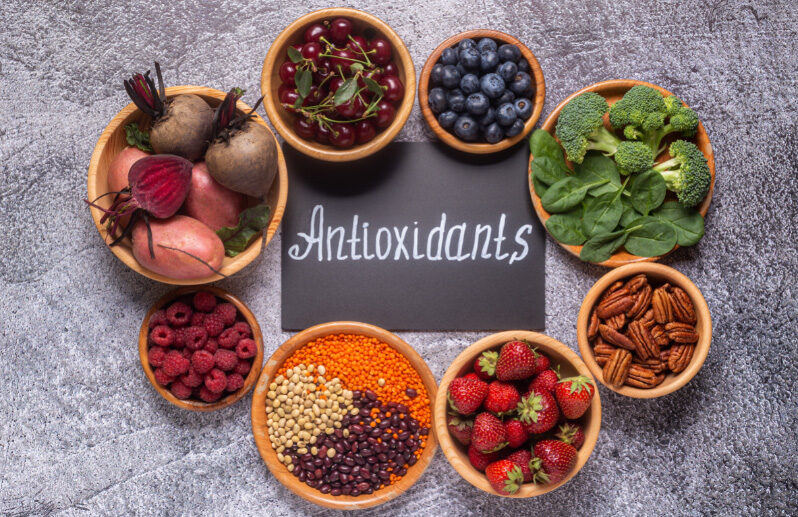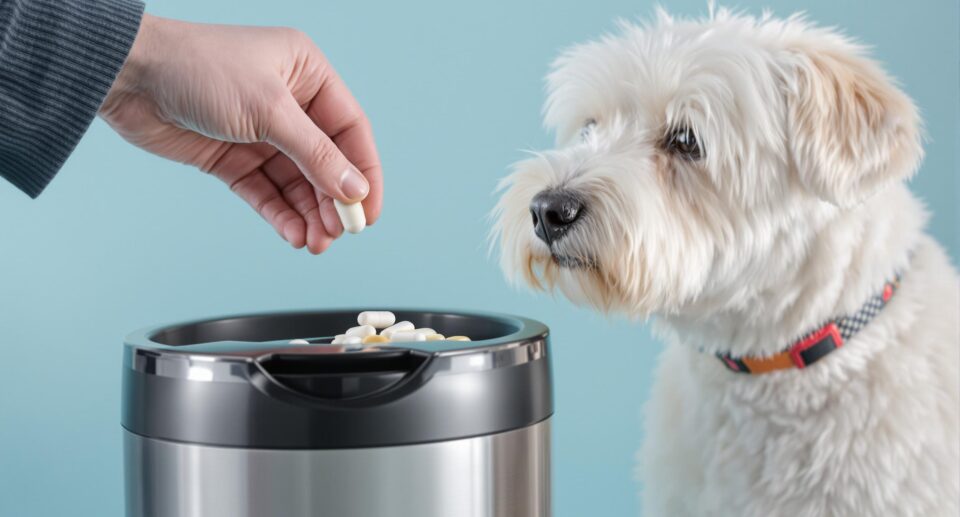How to Prevent Cancer in your Dog

Powerful Cancer-Fighting Foods To Boost Your Pet’s Diet
Have you ever lost a pet to cancer? It is becoming so common in domestic pets that most people will eventually lose an animal to some type of cancer. Cancer is a leading cause of death in pets, affecting 47% of dogs and 32% of cats.
On the bright side, we are continually learning more about the treatment and prevention of cancer each year. Groundbreaking studies on mice, humans, cats and dogs are giving us hope for a future with fewer lives lost too soon to cancer. We already know that you can feed your pet a cancer prevention diet to lessen the chances that they will become a statistic.
Why Pets Get Cancer
Normal, healthy cells go through a life cycle of growth, division and apoptosis, programmed cell death. In cancerous cells, this process is interrupted. Instead of dying, the cells grow out of control. The cancer cells may then form a tumor that can damage the healthy tissue surrounding it. In blood cancers, the abnormal cell division occurs in the bloodstream.
Cells naturally create free radicals through the process of oxidation. Exposure to carcinogens causes your pet’s cells to produce an unnaturally high concentration of free radicals. Free radicals change or damage the genetic material within cells and interrupt the normal cell cycle.
There are hundreds of types of carcinogens, some which researchers have studied to be known causes of cancer, while there are many other carcinogens that we do not yet know about.
Carcinogens… They’re Everywhere!
Carcinogens exist everywhere in your pet’s environment. Synthetic fragrances, chemical cleaners and lawn chemicals are some of the most obvious, somewhat avoidable sources of carcinogens that your pet can encounter on a daily basis. Switching to natural solutions can help reduce your pet’s exposure. When possible, use baking soda, lemon juice or vinegar to clean surfaces around your home.
Processed pet foods contain varying levels of carcinogens. For example, it’s common for crops to be contaminated with molds that create carcinogens called aflatoxins. The corn, wheat, rice or legumes that make up your pet’s food can sometimes be contaminated with aflatoxins.
When a product is tested to contain high levels of aflatoxins, it may be recalled, but food products can still be sold if they contain a passable level of contaminants. This does not mean that they are safe; your pet may be affected by small amounts of carcinogens over a long period of time.
Choosing The Right Pet Food
Using natural products and avoiding processed foods can help lessen your pet’s exposure to carcinogens. Realistically, though, you may not be able to feed a completely fresh diet. Some processed pet foods are better than others.
Processed pet foods, particularly dry kibble, are high in processed carbohydrates. Excess carbohydrates turn into sugar, which, coincidentally, seems to fuel the growth of cancerous cells. There is a growing body of evidence that suggests that cutting back on carbohydrates can prevent cancer and slow tumor growth in lab mice, domestic pets, and even people.
High quality protein sources, however, are expensive. Grains and legumes that are rich in refined carbohydrates are cheap – not to mention, commonly affected by cancer-causing contaminants. If you can, opt for a raw or cooked diet that is made commercially or approved by your veterinarian.
If fresh food is not an option, read the labels on canned or dry foods while you shop. At least two of the first three ingredients should be some sort of meat or meat meal. Avoid foods that contain artificial dyes – naturally derived dyes like beet juice are acceptable.
Food and treats contain preservatives to help keep them fresh. Natural preservatives like tocopherols and vitamin C are preferred. Low-quality treats commonly contain sugar as a preservative; remember, cancer loves sugar. Artificial preservatives, genetically modified ingredients, and chemical preservatives like BHT and BHA are also best avoided.
The product label will not always reveal everything you need to know. USDA certified organic pet products must meet high standards to earn that seal, while anyone can say that their product is “natural.” If you’re unsure, call the customer service number on the container, or research the product online before you buy it.
Your pet will be exposed to carcinogens no matter what choices you make. Adding cancer-fighting fresh foods to your pet’s diet can help protect them from those unavoidable carcinogens.
Antioxidant-Rich Fresh Foods
Antioxidants neutralize free radicals, preventing them from causing the genetic damage that leads to cancer. Some examples of antioxidants include beta-carotene, selenium, and vitamins A, C, D and E. Some antioxidants created within in the body, and others can be found in fresh foods that you can add to your pet’s diet.
- Berries – like strawberries, blueberries, cranberries and blackberries are high in vitamins A, C, D and E. Feed berries whole, steamed or pureed.
- Root vegetables – like carrots, sweet potatoes and beets are high in beta-carotene and vitamin A. They are best fed steamed, fermented or pureed.
- Dark leafy greens – like kale and spinach are best fed steamed, fermented or pureed. Scottish Terriers that ate green veggies at least three times per week were found to be 50% less likely to develop bladder cancer. Greens are also anti-inflammatory and contain chlorophyll, which can block the absorption of aflatoxins.
- Cruciferous vegetables – like broccoli and cauliflower contain sulforaphane, an antioxidant which has been shown to fight osteosarcoma in dogs.
- Green tea – is a great source of antioxidants, and can also encourage your pets to stay hydrated. Make sure it is decaffeinated.
- Nuts and seeds – are packed with antioxidants, but are also high in fats and can cause your pets to gain weight. They are best served crushed, fermented or pureed. Walnuts, in particular, are packed with antioxidants vitamin E and polyphenols.
Introduce new fresh foods to your pet’s diet gradually, one at a time. Some pets may have allergic reactions or digestive upset from certain foods, so it is important that you are able to isolate a new food that could trigger adverse reactions.
Foods That Reduce Inflammation
Inflammation, caused by other conditions like illness and injury, causes your pet’s cells to produce chemicals called cytokines. Cytokines cause the cells to divide rapidly, rather than die off, leading to the abnormal cell growth that causes cancer. Preventing inflammation keeps this process under control.
Many antioxidant-rich foods like berries and leafy greens also have anti-inflammatory properties. There are even more foods you can feed to fight inflammation:
- Omega-3 Fatty acids – found in fish. Feed sardines, oysters and salmon, canned in water with no salt added.
- Turmeric – contains a fat-soluble chemical compound called curcumin which fights inflammation. Making homemade golden paste is the best way to ensure your pet’s body absorbs the curcumin.
- Ginger – has been shown to inhibit breast cancer in mice.
- Cinnamon – contains cinnamaldehyde, a chemical compound that has been found to inhibit the progression of melanoma. Cinnamon also soothes digestive upset.
Powered spices can be brewed into a tea, baked into a treat or mixed into your pet’s food. Spices can lower blood sugar and blood pressure, so consult your veterinarian if your pet has diabetes or a heart condition, or if you are otherwise unsure about supplementing their diet.
Foods That Boost The Immune System
Cancer cells develop in your pet’s body each and every day. If their immune system is working correctly, those faulty cells will be destroyed before they can grow out of control.
Your pet’s digestive system is the cornerstone of their immune system. Their gut houses a variety of beneficial bacteria that can protect your pet’s body from carcinogens found in their food and allow them to pass harmlessly through their feces.
So, to feed your pet’s gut flora is to support their immune system. One way to do this is to make sure they get a source of probiotics in their diet, either with a supplement or a food that contains live active cultures, like yogurt or kefir. Make sure you use plain varieties with no added sugar.
Raw meat and eggs contain naturally occurring digestive enzymes that aid in digestion and support your pet’s gut health. The digestive system of a healthy cat or dog is short and more acidic than a human’s, making it an inhospitable environment for harmful bacteria like salmonella. If you cannot feed a balanced raw diet, using raw meat or eggs as toppers or snacks to replace 10-15% of your pet’s food.
Feed Less To Prevent Cancer
According to the Association for Pet Obesity Prevention (APOP), 59% of cats and 54% of dogs are overweight or obese. Observational studies in humans show a link between obesity and an increased chance of developing many different types of cancer, though it is not known exactly how excess weight leads to cancer. It’s likely a combination of factors – hormone fluctuation, increased blood insulin levels and inflammation.
If you suspect your pet is overweight, talk to your veterinarian about choosing a target goal weight, creating a weight loss plan, and to check for underlying issues like hypothyroidism. If your pet is otherwise healthy, you can help them lose weight with more exercise and a reduced calorie diet. What’s more, studies have shown that reduced calorie diets and intermittent fasting can prevent cancer and slow tumor growth. Avoid making extreme cuts to your pet’s diet without the help of a veterinarian, as this can lead to malnutrition. Instead, simply restrict their food intake to 1-2 meals per day, rather than keeping their bowl full all day long. This mostly applies to dogs; cats can quickly develop hepatic lipidosis if they do not eat for long periods of time.
Switching To A Cancer Prevention Diet
The amounts of anti-cancer foods you can add to your pet’s diet will depend on their weight, age and metabolism. You can experiment with adding small amounts to treats or to their food. You can even create pet-friendly smoothies that you can pour over kibble or serve as a treat. Ask your veterinarian if you are considering making drastic changes to your pet’s diet, especially if you are developing a complete, homemade diet or if your pet has any existing health conditions.





